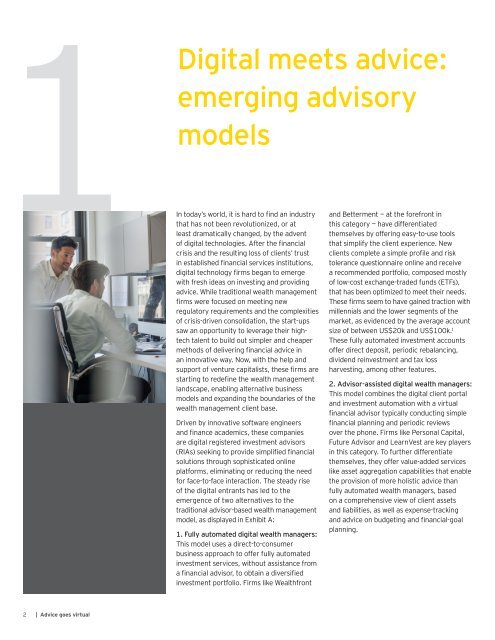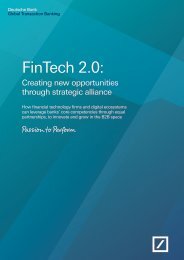You also want an ePaper? Increase the reach of your titles
YUMPU automatically turns print PDFs into web optimized ePapers that Google loves.
Digital meets advice:<br />
emerging advisory<br />
models<br />
In today’s world, it is hard to find an industry<br />
that has not been revolutionized, or at<br />
least dramatically changed, by the advent<br />
of digital technologies. After the financial<br />
crisis and the resulting loss of clients’ trust<br />
in established financial services institutions,<br />
digital technology firms began to emerge<br />
with fresh ideas on investing and providing<br />
advice. While traditional wealth management<br />
firms were focused on meeting new<br />
regulatory requirements and the complexities<br />
of crisis-driven consolidation, the start-ups<br />
saw an opportunity to leverage their hightech<br />
talent to build out simpler and cheaper<br />
methods of delivering financial advice in<br />
an innovative way. Now, with the help and<br />
support of venture capitalists, these firms are<br />
starting to redefine the wealth management<br />
landscape, enabling alternative business<br />
models and expanding the boundaries of the<br />
wealth management client base.<br />
Driven by innovative software engineers<br />
and finance academics, these companies<br />
are digital registered investment advisors<br />
(RIAs) seeking to provide simplified financial<br />
solutions through sophisticated online<br />
platforms, eliminating or reducing the need<br />
for face-to-face interaction. The steady rise<br />
of the digital entrants has led to the<br />
emergence of two alternatives to the<br />
traditional advisor-based wealth management<br />
model, as displayed in Exhibit A:<br />
1. Fully automated digital wealth managers:<br />
This model uses a direct-to-consumer<br />
business approach to offer fully automated<br />
investment services, without assistance from<br />
a financial advisor, to obtain a diversified<br />
investment portfolio. Firms like Wealthfront<br />
and Betterment — at the forefront in<br />
this category — have differentiated<br />
themselves by offering easy-to-use tools<br />
that simplify the client experience. New<br />
clients complete a simple profile and risk<br />
tolerance questionnaire online and receive<br />
a recommended portfolio, composed mostly<br />
of low-cost exchange-traded funds (ETFs),<br />
that has been optimized to meet their needs.<br />
These firms seem to have gained traction with<br />
millennials and the lower segments of the<br />
market, as evidenced by the average account<br />
size of between US$20k and US$100k. 1<br />
These fully automated investment accounts<br />
offer direct deposit, periodic rebalancing,<br />
dividend reinvestment and tax loss<br />
harvesting, among other features.<br />
2. Advisor-assisted digital wealth managers:<br />
This model combines the digital client portal<br />
and investment automation with a <strong>virtual</strong><br />
financial advisor typically conducting simple<br />
financial planning and periodic reviews<br />
over the phone. Firms like Personal Capital,<br />
Future Advisor and LearnVest are key players<br />
in this category. To further differentiate<br />
themselves, they offer value-added services<br />
like asset aggregation capabilities that enable<br />
the provision of more holistic advice than<br />
fully automated wealth managers, based<br />
on a comprehensive view of client assets<br />
and liabilities, as well as expense-tracking<br />
and advice on budgeting and financial-goal<br />
planning.<br />
2 | <strong>Advice</strong> <strong>goes</strong> <strong>virtual</strong>



